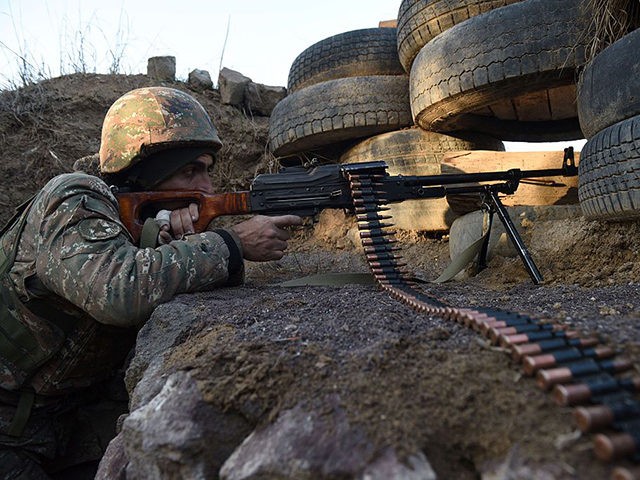The Canadian government has suspended the export of target acquisition equipment — used in military drones — to Turkey over reports that Azeri forces fighting in Nagorno-Karabakh used the technology, Reuters reported Monday.
Canadian Foreign Affairs Minister Francois-Philippe Champagne attributed the measure to suspend the export permits to Turkey as being due to “ongoing hostilities,” adding the move was “in line with Canada’s robust export-control regime,” according to Canada’s Globe and Mail.
Turkey, under Islamist President Recep Tayyip Erdogan, is backing Azerbaijan in a territorial dispute with Armenia, which shares a border with both countries. Fighting erupted along the Azeri-Armenian border in late September, prompting the combatant nations to declare martial law; the fighting has since spread beyond the conflict zone and into civilian areas. The majority-Shia Muslim Azeris are an ethnic Turkic people, prompting Turkey to view Azerbaijan as a sister nation. Erdogan and his minister have energetically vowed support for the Azeri cause.
The Canadian advocacy group Project Ploughshares asserts that drone strike videos, published by the Azeri government, show the drones in question were equipped with Canadian-made targeting and imaging equipment, Reuters reported.
Canada announced in late September that it would investigate the Project Ploughshares allegations that the Azeris used Canadian drone technology to strike Armenia, according to the Globe and Mail. If true, the technology would likely have come through Turkey, which is reportedly sending other forms of military support to Baku.
Armenia has also accused Turkey of funneling thousands of Syrian jihadists from its occupation of northern Syria to fight for Azerbaijan in the escalating conflict. Though Azerbaijan has denied this, the Turkish government remains silent on the matter. Interviews with alleged Syrian mercenaries have surfaced in multiple media outlets, most of them claiming they were not jihadis but civilians offered “guard” work and ambushed with battle once they arrived in the Caucasus.
The disputed region of Nagorno-Karabakh, a 95-percent Christian Armenian territory, has been separate from Armenia since the 1920s, when Russian dictator Joseph Stalin placed it under the jurisdiction of the Azerbaijan Soviet Socialist Republic as part of a “divide and rule” strategy.
Following the collapse of the Soviet Union, two of its successor states, Armenia and Azerbaijan, vied for sovereignty over Nagorno-Karabakh in a bloody war that concluded in 1994, leaving the region in a precarious position diplomatically.
Turkey, for its part, committed one of the first modern genocides in 1915, under the cover of World War I, killing roughly 1.5 million Armenians — and other Christian minorities — living within the Ottoman Empire. Turkey still has yet to acknowledge the Armenian Genocide.
Armenian Prime Minister Nikol Pashinyan drew a connection between the genocide and Turkey’s current military actions against Armenia.
“Why has Turkey returned to the South Caucasus 100 years later? To continue the Armenian Genocide,” he wrote in a Facebook post. “Armenia and the Armenians of the South Caucasus are the last remaining obstacle on the way of continued Turkish expansion towards the North, the North East, and the East, and the realization of its imperialistic dream.”
Though a NATO member, Turkey’s international shenanigans have unsettled other members of the bloc. In recent years, Erdogan has launched a number of foreign military adventures, beginning in 2019 with his invasion of northern Syria.
In 2020, the Turkish military deployed to Libya to prop up the Government of National Accord (GNA) against Khalifa Haftar, a military leader with support from Russia and Egypt. He further stoked tensions with the Greek military — another NATO member and nominal ally — and even weighed in diplomatically in the Indo-Pakistani border dispute over Kashmir.

COMMENTS
Please let us know if you're having issues with commenting.